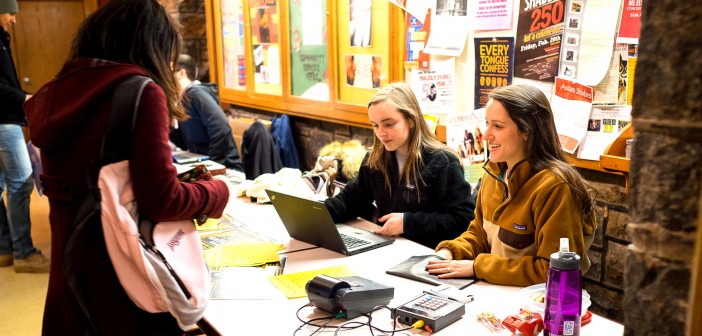There are more than 150 clubs and organizations across campus that use tabling as a way to advertise or fundraise. While tabling is popular among the student body, students are sometimes frustrated with the rules and regulations involved, as they believe these rules can impede their ability to promote their causes.
Tabling usually takes place in the University Center or on the front lawn, and permission for tabling must be granted by Reservation Services in advance in order to reserve a space. University-affiliated organizations are allowed to advertise and sell related merchandise for free. Yet, outside vendors must pay $25 10 days in advance, as well as give 10 percent of gross sales to the Student Center Facilities. This rule can have a negative effect on some students, as the university deems “outside vendor” as anybody who sells a product for a purpose that is not affiliated with a Lehigh organization.
Evan Eckersley, ’17, said he believes this rule can get in the way of students displaying their accomplishments. As a member of two bands on campus, neither of which are affiliated with Lehigh, he feels that the administration is preventing him from sharing his talent with his classmates. The fees to sell CDs, he said, are a lot for broke college students, and it prevents the band’s music from spreading across campus.
“We’re students here,” Eckersley said. “It’s ridiculous that we’ve created something that could make a positive contribution to the school and we have to pay to promote it just because we’re not technically recognized by the school.”
Connie Rizzo, who has worked for Reservation Services for two years, said this rule is in place in order to ensure that Lehigh receives payment for profit that is made on its property. She said the campus is a popular site for local vendors to promote their products. The university, she said, simply sees this as another service they provide for which they want to be compensated.
“It’s not like the administration is trying to discourage students from starting something themselves,” Rizzo said. “But a lot of money goes into taking care of all the facilities on campus, so it wouldn’t be fair to let someone make money off that for free.”
Students may register their organizations with Student Affairs to become recognized by the university.
However, university-affiliated organizations are also affected by these rules when it comes to selling food as a means of fundraising. Due to a contract between Lehigh and Sodexo, only food prepared by Lehigh Dining Services may be sold on Lehigh property. While a 30 percent discount is given to university organizations, it is only applicable to groups willing to pick up, setup and cleanup the food themselves, making it difficult for groups with large orders or limited access to transportation to receive the discount.
Cheyenne Begley, ’16, a member of Kappa Alpha Theta sorority, said the food restrictions limit how much money her sorority is able to raise for its philanthropy. She said because the sorority is forced to buy baked goods from Lehigh’s catering services, the sorority spends more money purchasing the food than it would by purchasing from an outside source. She said because the girls in her sorority pay their own dues, the group should be allowed to decide for themselves how they fundraise. The rule, Begley said, takes away from the students’ ability to be in charge of their own organizations.
David Joseph, the executive director of Student Auxiliary Services, assures that the contract is not in place as a means of taking power away from the students. He said it is for risk management purposes, forcing Sodexo to live up to its responsibilities while also ensuring that the university avoids any potential negligence.
“Sodexo are experts in handling food,” Joseph said. “They know how to properly cook, clean, store and serve food. Lehigh doesn’t have licensed professionals like that. So they pay an outside company to come in and oversee the dining services.”
Joseph said the risk management outlook is widely misunderstood among the student body. Most students see it as a marketing ploy, instead of from a legal standpoint.
“I think most students think that we have this deal with Sodexo where we say ‘Okay, we’re going to help you make as much money as you can by making sure the students can only buy food from you’ but that’s just ridiculous,” Joseph said. “It’s to make sure the school isn’t held accountable if something goes wrong, like a salmonella outbreak or something.”
But despite its expertise in handling food, members of some cultural organizations said the food is an integral part of their organization’s purpose that cannot be fulfilled by Lehigh’s catering services. Joseph acknowledges that this rule makes it difficult for some cultural organizations to express themselves. In certain circumstances, he said, permission is granted for outside vendors to serve food.
However, Joseph said this is also difficult to arrange, as liability insurance is required for external food vendors. If the vendor does not have proof of insurance, the vendor would not be allowed to serve food on campus.
Joseph said that while the groups’ complaints aren’t unreasonable, a balance must be found between adequate representation of a club and the school’s ability to avoid negligence.
“The students have to understand that this arrangement is a way of looking out for their well-being,” Joseph said.






Comment policy
Comments posted to The Brown and White website are reviewed by a moderator before being approved. Incendiary speech or harassing language, including comments targeted at individuals, may be deemed unacceptable and not published. Spam and other soliciting will also be declined.
The Brown and White also reserves the right to not publish entirely anonymous comments.